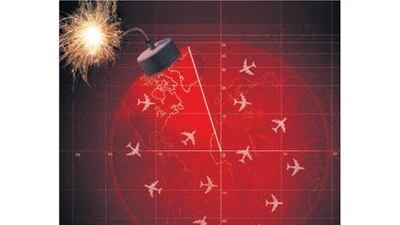In the nearly 10 years since the September 11 attacks in the US, we have had a shoe bomber in December 2001, the liquids scare in 2006 and the underwear bomber last Christmas Day. The latest incident may represent a new threat involving explosive powder, or may just be a twist on the liquids scare. An investigation was ordered by the White House and is under way.
If the explosive powder case does add a new element, it could trigger a new wave of air security rules. Some would be publicised, while others would not. That is because US federal law bars airlines flying to the US from revealing the directives they receive from the Transportation Security Administration (TSA). The reasoning is valid - if would-be hijackers know what screening procedures the US employs, they would have a higher chance of evading them.
Immediately after the incident, new directives were issued for US flights regarding passengers' use of blankets and lavatories, although these were eased a few days later. Attention has also focused on body scanners that can detect hidden items such as the explosive device that Umar Farouk Abdulmutallab had allegedly sewed into his underwear in preparation for his attack aboard Northwest Airlines Flight 253 as it was arriving in Detroit from Amsterdam.
Body scanners are likely to become more common, and the US government plans to have 450 devices in place by September for use as a front-line screening tool. There has been speculation that the TSA may take such extra measures as patting the soles of passengers' feet, searching bags even after they pass the scanner, and banning extra carry-on bags. Immediately after the Christmas Day incident, the US ordered new procedures for travellers going to the US from any of 14 listed countries. All of the countries except Cuba, Afghanistan and Pakistan are in the Middle East and Africa, meaning Gulf airlines are on the front lines of this issue. Their business plans call for connecting the East and West via their hubs in Dubai, Abu Dhabi and Doha. That means Etihad Airways, Emirates Airline and Qatar Airways, which collectively serve six US cities, carry passengers from most of the source countries the US is concerned about. All of this extra screening will complicate the picture for Middle East carriers, says Doug McVitie, the chief consultant for Arran Aerospace.
"For airlines such as those in the Middle East who rely on composite travel - filling their US-bound flights with transit passengers from a variety of countries in the region and in Africa - the scenario is clearly one of more delays, more cost and more inconvenience as additional checks are made and security is tightened across the board," he says. These carriers have long been pushing into emerging markets that have strong demand but have traditionally had weak locally based air services. Etihad, for example, has announced it will fly to two cities in Nigeria, although it has not scheduled a launch date yet.
The three big Gulf carriers operate in dynamic environments, and all have had to scale back services in response to market changes and geopolitical instability, such as when the civil war in Sri Lanka dragged down tourism, or when the security situation in Pakistan caused a rerouting of Peshawar services to Islamabad last year. If anything, the air travel industry teaches us that we are all in the security fight together, since air travel is arguably the world's most globalised industry.
When a passenger arrives in Dubai from London's Heathrow, the UAE is relying on the screening procedures by UK authorities to prevent dangerous persons entering the country, and vice versa when passengers fly in the opposite direction. A number of governmental and non-governmental organisations work together to ensure safety procedures are up to date, including the International Civil Aviation Organisation (ICAO) and the International Air Transport Association (IATA). For flights to the US, the TSA also has regulatory control, and a TSA representative is based in Abu Dhabi.
It is the TSA that approves screening procedures for US-bound flights, such as certifying certain gates and terminals from which such flights may operate. Both Emirates and Etihad have vowed to remain "in full compliance" with the TSA's evolving security measures. Among the questions the US investigation over the Christmas incident aims to answer is why Mr Abdulmutallab's alleged attack failed, and whether there are implications for updated screening procedures. Also needing to be answered will be questions such as why the red flags raised by Mr Abdulmutallab's father in Nigeria did not lead authorities to place the suspect on a no-fly list and revoke his US visa; and whether there were lapses at the Amsterdam airport, where Mr Abdulmutallab boarded the Northwest flight.
Some of the findings could have implications for the travel experience of all passengers, as security procedures seek to stay one step ahead of the technology that would-be attackers use for smuggling explosives on to flights. Some of the screening rules may seem onerous, but just remember: we are all in this together. And don't forget to take that laptop out of your bag. @Email:igale@thenational.ae

